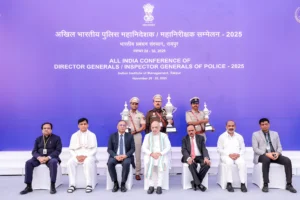
Jamnalal Bajaj
Jamnalal Bajaj epitomized simplicity in his stance against untouchability. As a Seth, he generously supported freedom fighters with his resources, prioritizing social service over profit. This dedication earned him the title of Mahatma Gandhi’s fifth adopted son.
The early life of Jamnalal Bajaj
Born on November 4, 1884, in Sikar, Rajasthan, Jamnalal was adopted by Seth Bachharaj Bajaj of Wardha at a young age. However, at 18, he renounced all his property, driven by a passion for charity and social work over business pursuits.
Jamnalal first met Gandhiji in 1915, upon the latter’s return to India from South Africa. Inspired by Gandhiji’s ideals, Jamnalal actively participated in his programs and became Treasurer of the All India Congress Committee in 1920. Seeking spiritual guidance, Jamnalal requested Gandhiji to adopt him as his son, a request Gandhiji warmly accepted.

Role in the freedom struggle
Jamnalal played a significant role in various agitational campaigns and the freedom movement, notably in Swadeshi and untouchability eradication movements. He was the first in the country to open his Sri Lakshmi-Narayan temple in Wardha to the public, including Harijans, in 1918. He established Wardha as a hub for Gandhiji’s activities and even provided land in a nearby village for Gandhiji’s residence, known as Sevagram.
Jamnalal residence, Bajajwadi, became a meeting place for national leaders, hosting Congress Executive meetings, including the historic Quit India resolution in 1942. Despite his industrial ventures, such as establishing a sugar mill in 1931, Jamnalal remained committed to Gandhiji’s principles and the promotion of Khadi.

Jamnalal legacy continued through his son, Kamal Nayan Bajaj, who upheld the family’s tradition of social service and commitment to national interests. Kamal Nayan focused on public welfare and social service programs, following his father’s footsteps while revitalizing sick industries with his business acumen.
The contributions of Jamnalal and Kamal Nayan Bajaj remain integral to India’s journey toward freedom and national development. Their dedication to social welfare and adherence to Gandhian principles continue to inspire generations.
As a social reformer
Jamnalal was a notable social reformer who took significant steps towards abolishing purdah in his own household and initiating the integration of Harijans (untouchables) into society. He broke barriers by opening the doors of his family-owned temple to Harijans, a pioneering move in India at the time. Additionally, he launched a campaign advocating for social equality by sharing meals with Harijans and allowing them access to public wells, which he generously opened in his fields and gardens.
In recognition of his remarkable social initiatives, the Bajaj Foundation established the prestigious Jamnalal Bajaj Award, with past recipients including renowned figures such as Nelson Mandela and Desmond Tutu. Jamnalal passed away on February 11, 1942, leaving behind a lasting legacy of social reform and inclusivity. In 1970, the Government of India honored his memory by issuing a commemorative postal stamp.
To read more such news, download Bharat Express news apps


















